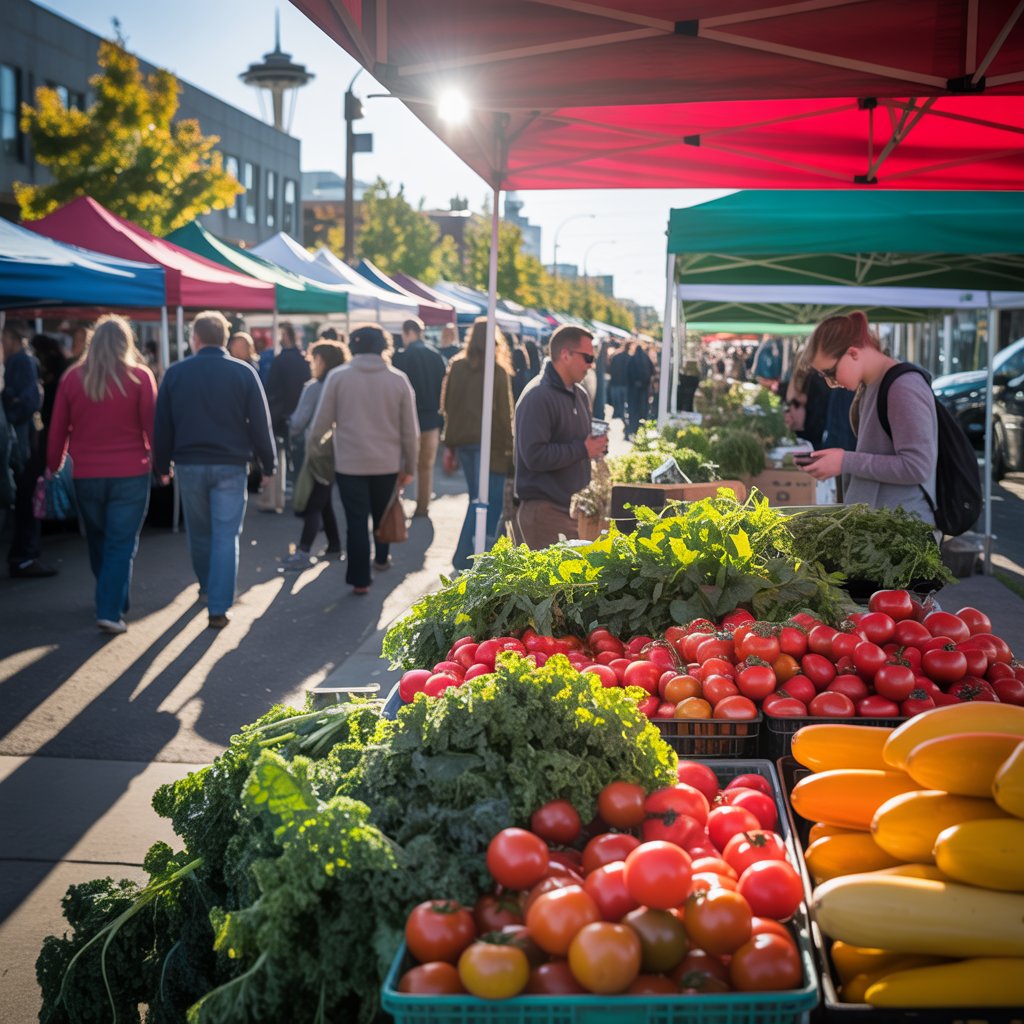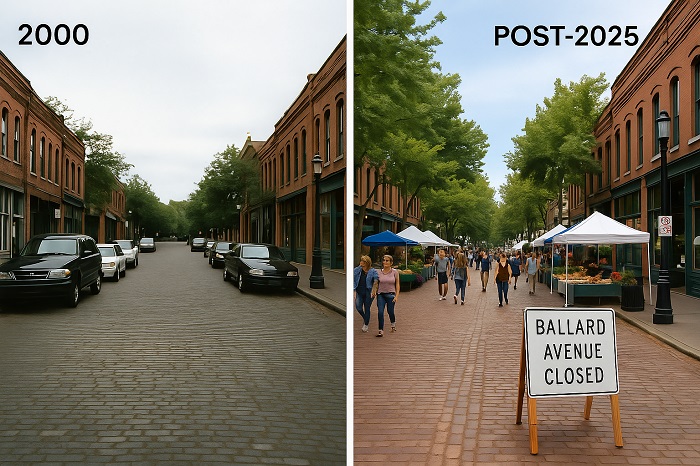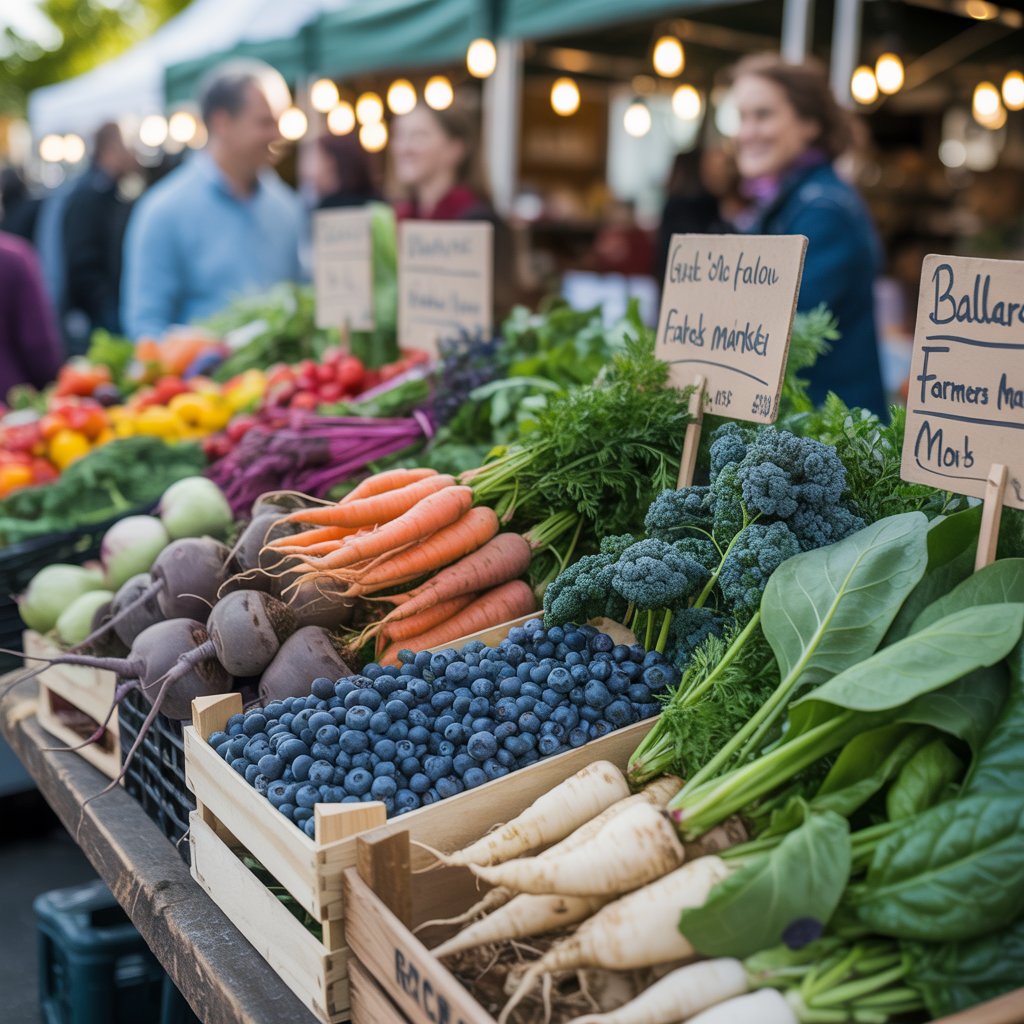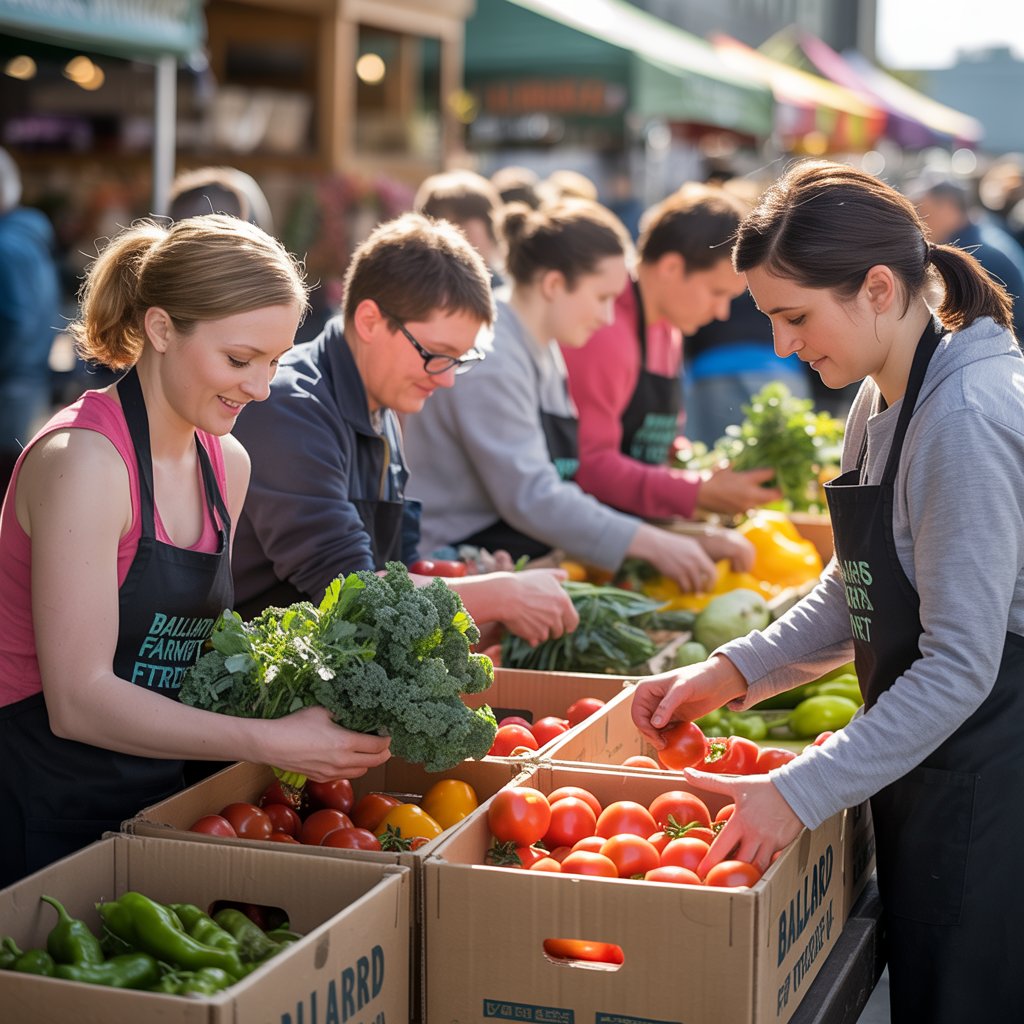What makes Ballard Farmers Market special?
The Ballard Farmers Market in Seattle is unique because we offer 100% Washington-grown products, a zero-waste gleaning program, food access for low-income families and vibrant community events like our annual Pride Parade—all on the cobblestone stretch of Ballard Avenue NW every Sunday.
Every Sunday, Ballard Avenue NW becomes Seattle’s most sustainable shopping street. Since 2000, the Ballard Farmers Market has become more than a marketplace—it’s a climate-conscious community hub. With 90+ local vendors, food access initiatives and a zero-waste gleaning program, we show how farmers, families and volunteers can build a greener city together.
History of the Ballard Farmers Market
Since we opened our cobblestone stalls in 2000, the Ballard Farmers Market has grown from a small neighborhood gathering into one of Seattle’s most beloved local food institutions. Originally launched to support Washington farmers and give residents access to fresh, seasonal produce, the market has evolved with the changing environmental, economic and social needs.
Over the years we’ve grown in size and scope. The 2025 redesign of Ballard Avenue NW created a pedestrian-only market corridor between 20th and 22nd Avenues, making it more accessible and safe. Climate-resilient practices like encouraging reusable packaging, supporting organic agriculture and launching the gleaning program have helped us adapt to the growing environmental challenges. Our success lies in being rooted in local tradition while embracing modern sustainability and inclusivity goals.
A Diverse Array of Vendors at the Ballard Farmers Market
At the heart of the Ballard Farmers Market are Washington’s dedicated growers and makers. Family farms like Skagit River Ranch have been selling organic, grass-fed meats here for over 20 years. Kirsop Farm comes from Rochester with certified organic vegetables and Bow Hill Blueberries brings rare heirloom varieties from Skagit County. Add Greenwood Cider’s heirloom apple ciders and Samish Bay’s handmade cheeses to the mix and it’s a showcase of the state’s best.
You can pre-order your favorites online—apples, eggs, bagels—and pick them up Sunday. Many of our vendors carry eco-certifications like Salmon Safe or Certified Naturally Grown. This grower-to-shopper connection encourages better farming practices and keeps your dollars local.

Shoppers: A Cross-Section of Seattle’s Communities
The Ballard Farmers Market sees 10,000–20,000 visitors each week, including eco-conscious millennials, retirees, and families with kids or pets. Programs like SNAP/EBT, WIC, and Market Match ensure fresh, local food is accessible to all income levels. In 2024 alone, thousands of discounted or subsidized purchases connected underserved shoppers with healthy food.
Live music, hot food vendors, pet-friendly rules, and handmade crafts make for a fun atmosphere. While prices may be higher for some, it’s fair wages and sustainable methods. Public transit access makes the market more inclusive.
Local Bounty: From Skagit to the Sound
All products at the Ballard Farmers Market are Washington grown, supporting nearby regions like:
• Skagit Valley – Blueberries, root vegetables
• Rochester – Certified organic greens
• Olympic Peninsula – Shellfish and seafood
By sourcing from local farms, the market reduces transport distances and supports local economies. This hyperlocal model preserves farmland, increases biodiversity through heirloom varieties and supports regional resilience.
Sustainability Metrics: Ballard vs. Supermarkets
The Ballard Farmers Market is way more sustainable than traditional grocery supply chains. While supermarket produce in the US travels 1,500 miles before it hits the shelves, most products at Ballard come from within 100 miles – many from right here in the neighborhood. That’s a big reduction in “food miles” which means lower greenhouse gas emissions, fresher food and a stronger local economy.
Plus, while grocery stores rely on plastic packaging and long-haul refrigeration, Ballard’s vendors promote minimal, compostable or reusable packaging. Shoppers bring their own bags and containers which reduces waste even more. These small changes add up to big sustainability wins and make the market a model for climate smart urban food systems.
Products that Reflect Sustainability and Craft
The market celebrates Washington’s agricultural strength:
• Fresh Produce: Heirloom tomatoes, organic kale, seasonal fruit
• Protein: Grass-fed beef, wild oysters, pasture-raised chicken
• Artisan Goods: Jams, honey, sourdough bread, soap
Vendors align with the market’s sustainability ethos by minimizing waste and offering goods made with local ingredients. Pre-orders help vendors reduce waste by only bringing what’s in demand.
What’s in Season: Ballard’s Produce Calendar
Season | Available Produce
Spring | Asparagus, spinach, radishes
Summer | Berries, corn, tomatoes
Fall | Apples, squash, carrots
Winter | Kale, potatoes, turnips
A Model Gleaning Program: From Surplus to Support
One standout program is the gleaning partnership between Sustainable Ballard, Farmore WA, and Ballard Food Bank. Each Sunday, volunteers collect leftover produce from vendors—food that would otherwise go to waste—and donate it to families in need. In 2024, over 15,458 pounds of food was redistributed.
When surplus is low, the “Farm it Forward” initiative allows visitors to donate funds that go directly to purchasing vendor produce for the food bank. This ensures consistency in donations while supporting farmers financially.
Food Access Programs: Making Local Food Inclusive
The market supports:
• SNAP/EBT & Market Match – Dollar-for-dollar matching for low-income shoppers
• WIC & FMNP – Coupons for fruits and vegetables
These programs create equity in healthy eating and expand the customer base for small farms.
Zero-Waste Commitment and Eco-Friendly Practices
The 2023 market expansion added pedestrian-only streets from 20th to 22nd Avenue NW, reducing vehicle congestion and creating a walkable, welcoming space. Visitors are encouraged to use reusable bags and containers, and food stalls emphasize compostable packaging. These habits are now a core part of the market’s sustainability experience.
Community Events and Volunteerism
The market is deeply tied to Seattle’s culture. Events like the 2025 Pride Parade and Drag Showcase brought together LGBTQ+ vendors, families, and allies. These celebrations reinforce the market’s mission: inclusivity, equity, and sustainability.
Volunteers are vital—gleaning, event support, and community outreach. Opportunities can be explored via Sustainable Ballard ([email protected]).
Tips for Visiting the Ballard Farmers Market
• Get here before noon for the best pickings
• Bring your own bags, containers and cash/cards
• Check out vendor maps on Fridays on SFMA website
• Use public transit to avoid parking woes
Looking Ahead: Opportunities and Ideas
Affordability is still a hurdle. While food access programs help, broader subsidies could make local food more accessible to all. The market may also expand:
• Workshops on composting, seasonal cooking
• Educational signage on sustainability
• Partnerships with local schools or culinary programs
Limitations and Feedback
While the Ballard Farmers Market is a model of sustainability, it’s not without its challenges:
• Affordability: Higher prices for locally grown produce may exclude middle-income shoppers who don’t qualify for assistance programs. The premium is for ethical labor and sustainable practices but creates a barrier for some.
• Weather: As an outdoor market, rainy or cold weather can reduce vendor participation and visitor turnout, revenue and consistency.
• Limited Hours: Only open on Sundays means those with rigid work schedules or limited weekend flexibility may not be able to get here regularly.
• Parking: Free Sunday street parking exists but fills up fast and limited parking can be frustrating for visitors from outside the Ballard neighborhood.
• Capacity: Due to its popularity and fixed footprint, the market may not be able to accommodate new vendors, limiting access for emerging farms and artisans.
But the market is adapting and innovating through community feedback, pilot programs like “Farm it Forward” and advocacy for policy support. Recognizing these areas of improvement only makes its mission for an inclusive, sustainable future stronger.
Conclusion: Why Ballard Farmers Market is the Gold Standard
Since 2000 the Ballard Farmers Market has grown from a Sunday ritual to a model for eco-friendly urban living. Its zero-waste systems, regional focus and community first ethos shows how food can connect people and the planet. For Seattle residents and visitors alike, it’s a place to nourish bodies, communities and the Earth.
Next Sunday, bring a reusable tote, chat with a farmer and be part of the Ballard Farmers Market story.


